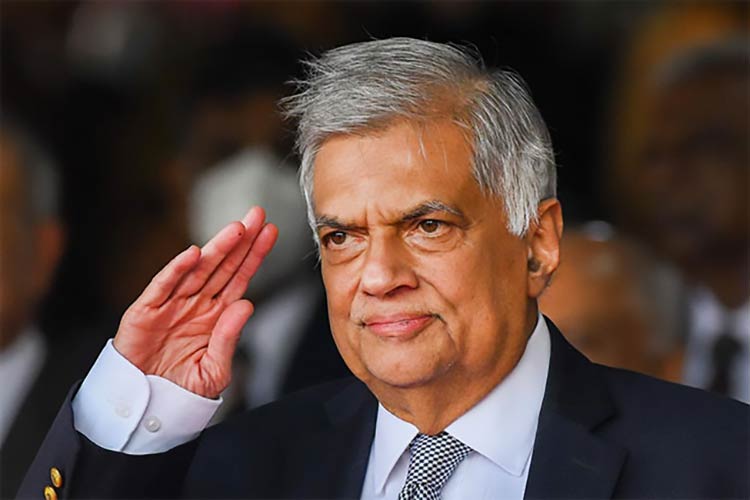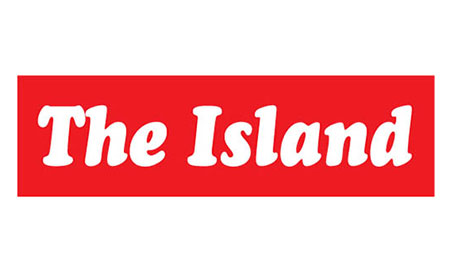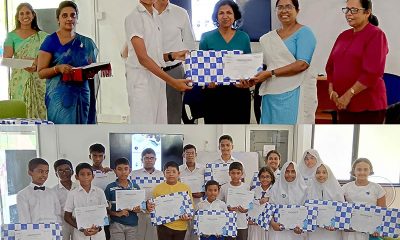Opinion
G.C. Rodrigo:Friend, Colleague and Comrade

by Kumar David
The phrase “When alone think clearly and when with others speak carefully” is attributed to Gautama Sidhartha. Though that may be apocryphal it certainly does depict his grace. Secondly, you will find that I sometimes refer to GCR as Gerard and sometimes as Chris depending on whether S. Thomas College or our later political comradeship is uppermost in the context.
Gerard at St Thomas’ College
Gerard was a Thomian, two years my junior in “College” and a very interesting chap he was. He came from a Roman Catholic family and at least till his early-teens was devout, distributing ‘The Messenger’ in the Dehiwala area where he lived. He was a strange fellow and I must tell you just one anecdote which I swear is true. It is known that the oscillation of a simple pendulum (your old-style grandfather clock) is governed by a linear equation (a simple equation, if you are not a science guy) if the oscillations are small, but if large there is no straightforward solution. Our physics master the redoubtable Aana (Mr Anandanayagam) dinned this into us with due pomp and we were all much impressed.
Gerard however, refused to be cowed, laboured away diligently, and weeks later approached Aana and inquired how he may apply for the Nobel Prize. Then the conversation went as follows: “Aha Rodrigo what have you discovered?” “Sir I have solved the problem of large oscillations of a pendulum”. Intrigued, Aana inquired, “Ah let me see, let me see Rodrigo”. “Oh no sir, then you will apply for the prize yourself” replied Gerard to an astounded Aana! There are many more hilarious stories I can tell you about Gerard’s eccentric College days.
Well time went by and GCR entered the Faculty of Engineering, Peradeniya, still two years my junior. At some point in the next three years, he came under the influence of Vickremabahu (Bahu) and like me, Vasu, Siritunga Jayasuriya, Sumanasiri Liyanage and Shanta de Alwis affiliated with Vama Samasamajaya, later renamed Nava Samasamajaya. Again, I have to digress to put you in the picture. While working for his Ph.D. in London GCR came under the influence of Ted Grant, the redoubtable old Trotskyite who advanced the thesis of “Entryism” which said that the working class would not desert its traditional organisations and that it was necessary to work inside the Labour Party and capture it, internally, by setting up in secret, a parallel party inside Labour.
Thus, came the famous, or infamous, Militant Organisation for which Ted was eventually expelled from Labour. This was the same thesis as that which Bahu had arrived, entirely independently of Ted and Militant. Okay, okay I know it’s getting a bit theoretical and political, but that’s unavoidable since GCR was essentially and intellectually a political animal.In the late 1970s Gerard, now Chris (Comrade Chris) invited Ted to Lanka where he conducted well attended public lectures and even presented some of his idiosyncratic views which I will touch on anon. Fat and flatulent, Ted also ran intensive small group discussions for “the comrades”. That was all well and good, but he would frequently emit discharges of gut-vapour which had the comrades diving for the exits from the small crowded room in search of fresh air to avoid asphyxiation.
Bahu, and his acolyte on this matter, Sumanasiri, voiced a most odd thesis which held that the essence of things depended on their origin, whatever their actual properties. True revolutionary states and movements were defined by their origin, not by what they had evolved into. Hence Cuba, Che and Fidel were not of the “essence” because these leaders had started off as petty-bourgeois idealists. Bahu held somewhat similar views of Mao’s China, Vietnam etc. but their Stalinist origins granted them a degree latitude in his eyes. Obscure Trotskyite groups in North America and Canada (World Socialist Website for example) had the right pedigree! This was far removed from Marx’s materialist reading of history. People like Siritunga, Vasu and I, more grounded in reality, laughed off this nonsense. Chris rejected it too but was more concerned about the organisational integrity of the movement and tried hard to broker a compromise and achieved some success. “Think calmly, speak carefully”, the maxim goes.
Ted took the absurd position that if the economy of a country was state owned then it was a “deformed worker’s state”. A worker’s state, because the economy was state owned, and deformed because it was a far cry from socialist democracy. Somewhat like Trotsky’s much critiqued analysis of the Soviet Union. Ted’s absurdity even made Burma, Ethiopia and Mongolia deformed “worker’s states”! Fortunately, Bahu, Sumanasiri and that lot did not follow Ted all the way into that miasma.
Comrade Chris
Sometime in the early middle period (that is 1970s) Chris met and married Milan Lin, an ethnic Chinese based in the Peradeniya Campus. Subsequently, after the two of them migrated to the US, Milan earned a Cornell PhD in her own right. She supported Chris in his most difficult days and remained his loyal companion to the end.
I have focussed on the political dimension up to now because that’s what my readers will be interested in, but GCR was much involved in development economics as well. Let me adapt (that is modify) and use a few quotes from personal reminiscences written by Prof. Shanta de Alwis of Colorado University who, intellectually, was the closest of us all to Chris’ way of thinking.
“Chris recognized earlier (sic!) than the rest of us, the deep-seated tribalism of the people of Sri Lanka and decided that he could best serve the cause by studying the underlying economic and social factors that affect the dynamics of a society. Consequently, he moved into management and economic studies, left his faculty job in electrical engineering and focussed on these studies. I venture to speculate that there are very few individuals who have done this successfully. He returned to SL and got involved in the struggle for human rights and social democracy. He became an independent consultant economist with association for a while with the IMF. In the last 15 years or so of his life, he was working on a major work on development economics which would have been his magnum opus. I learnt a lot from him – particularly on economic issues and more broadly on the evolution of human society and the need to go beyond Marx in understanding modern capitalist society. We were broadly in agreement on US, Sri Lankan and British politics”.
We have all known that GCR no longer referred to himself as a Marxist, politically was perhaps a, and had evolved into a scholar of development economics and a consultant with international exposure but this is the first inkling that I have had that Shanta de Alwis too may have begun to distance himself from Marx’s philosophy and historical outlook.
Chris’ formal academic record is indeed impressive. a) Ph.D. in Economics (Trade, Growth & Development), Cornell University, Ithaca NY,1994; b) MBA; School of Management, Yale University, New Haven; c) Ph.D. in Electrical Engineering, Queen Mary College, University of London, UK, 1970 – his first Ph.D.; d) B.Sc. Electrical Engineering, University of Ceylon, Peradeniya, 1965.
Dr Rodrigo: Economist and International Consultant
Chris worked as an international consultant on projects in Rwanda, Egypt and Saudi Arabia and engaged in policy-oriented work at the IMF and the World Bank. Regarding Sri Lanka he was interested in housing market trends, poverty and inequality. He was interested in post-conflict reconstruction, upgrading industry competitiveness and support of SMEs. It is clear that GCR had through work involvements changed from a sharp left political activist into someone who believed that adapting and working with and within capitalism was appropriate. This ideological change occurred in many scholars after the Great Recession of the early 21st Century. I sure many would today reconsider this mistaken view.
Chris loved to sing. A lady named Mangalika, I think, would thump on the piano in Aniwatte, Kandy, as Chris belted out in his trained tenor voice accompanied by his cousin. He liked Wagner’s Das Rheingold and Gotterdammerung but I don’t think he tried such difficult compositions.
G.C. Rodrigo lived a full life and achieved much in the political, intellectual and personal domains. God-speed to him in the hereafter.
Opinion
Danger of manipulating electoral process

Unfortunately, from the time of the Yahapalanaya, governments of Sri Lanka, too, seem to have joined the ranks of scammers, the biggest nuisance of modern times due to misuse of technology. The bond-scams were followed by a sugar-tax-scam and, the latest, the visa-scam. What happens invariably with all these scams is that the initial furore is allowed to die down when things are swept under the carpet!
By Dr Upul Wijayawardhana
There was a temporary resurgence of Ranil Wickremesinghe’s reputation when he stepped in to fill the vacuum created by the unexpected resignation of President Gotabaya Rajapaksa and became the ‘man of the hour’ by steadying the ship of economy and preventing the threatened illegal occupation of the parliament. However, electoral manipulations since have made one doubt whether he is a true democrat.
Ranil started showing his true colours during the Yahapalana regime when not one, but two Central Bank bond-scams occurred on his watch. He brought in his friend Arjuna Mahendran to head the Central Bank. To prevent exposure of the first bond-scam, Ranil got the then President Maithripala Sirisena to dissolve the parliament. The Yahapalana government subsequently perpetrated the second bond-scam. One of the MPs had the audacity to write a book to prove no scam occurred in spite of, no less a person than Ranil’s cousin, Prof Rajiva Wijesinha declaring openly that the bond-scams had been perpetrated to replenish depleted UNP funds! After Ranil became President, Mahendran had the audacity to write a letter to The Island giving his full Singapore address, an unusual thing for him to do unless it was meant to imply that he is above the law.
Whilst wasting scarce public funds on foreign trips and tamashas, Ranil prevented the holding of local government elections by refusing to release funds even though nominations had already been finalised, which is a gross manipulation of the electoral process. So, was the postponement of provincial council elections during Yahapalana times.
Unfortunately, from the time of the Yahapalanaya, governments of Sri Lanka, too, seem to have joined the ranks of scammers, the biggest nuisance of modern times due to misuse of technology. The bond-scams were followed by a sugar-tax-scam and, the latest, the visa-scam. What happens invariably with all these scams is that the initial furore is allowed to die down when things are swept under the carpet!
I was surprised to read in the political column of a national newspaper, not The Island, that visa problems had been solved! Since the publication of my opinion piece Idiocy of new visa arrangements in The Island of 07 May, the only significant change that has been made is the reintroduction of the most used category; 30-day visa. It is beyond comprehension how the most widely used category of visa was omitted from the new system which was touted as a vast improvement based on feed-back. Reintroduced 30-day on-line visa costs $50, but $10 goes as service charges instead of the previous practice of the entire charge being credited to the exchequer. Further, the transactions are now through a Dubai bank, not through a Sri Lankan bank, as previously done. It looks increasingly likely that the new system was introduced not on feed-back but on kick-backs! The fact that officials summoned by the Committee on Public Finance did not turn up lends to the likelihood that it was a political decision which the officials acquiesced to. The Chairman of CoPF told parliament that some MPs threatened him for continuing to investigate the visa scam!
Ranil has defended the corrupt as evident from the sacking of Sports Minister Roshan Ranasinghe, who attempted to take action against the Cricket Board, which was found to have committed fraud by the Auditor General. As well explained in the editorial Playing ball, the govt’s way (The Island, 12 June), most likely on orders from Ranil, the Sports Minister has published a gazette notification seeking to enable the Sri Lanka Cricket (SLC) President and Secretary to remain in their positions for eight years and thereafter serve as Executive Committee members. This is in violation of the resolution passed unanimously by the parliament and as stated by the Chief opposition Whip, the gazette at issue is likely to help the government secure funds for its election campaigns from those who benefit from corrupt cricket deals.
Whether elections would be held is the million-dollar question. As the editorial referred to, points out: “The SLPP-UNP government is currently in the extension mode, as it were. It has reportedly granted service extensions to some defence bigwigs and is all out to extend the term of the incumbent Attorney-General. The UNP has not given up its efforts to extend President Ranil Wickremesinghe’s term by postponing the upcoming presidential election.”
UNP General Secretary Palitha Range Bandara proposed a referendum to extend the life of the parliament and that of the president by two years and in spite of widespread criticism and contrary to the opinion of constitutional experts, maintains that it is constitutional to do so! It is rumoured that Ranil is now attempting to extend his presidency by a year through parliament, citing some lapses in the past. It looks as if he entertained the warped logic that two wrongs make a right!
Whilst some henchmen of Ranil are busy propagating the idea of an extension, others are maintaining that elections would be held, one predicting that it would be on 05 October, and forecast that Ranil would be the winner. All these manipulations are likely to result in Ranil losing whatever little support and respect he has and come the next election, the UNP may well be relegated to oblivion, again!
We may be heading for an era devoid of the UNP, SLPP and SLFP, which Sirisena has already destroyed. If SLPP continues to support Ranil, it is likely to face the same fate as the UNP and the SLFP. Perhaps, it is better for the SLPP to nominate Gotabaya Rajapaksa, as the candidate as that, if not anything else, would give an opportunity to test the public’s verdict on his ouster! I do not shed tears for any of these parties but am in constant worry that any further attempts by Ranil to manipulate the electoral process may lead to a violent Aragalaya. I do hope Ranil would end all speculation, even if he decides not to contest or takes time to decide, rather than allow apparent manipulations to lead to disaster, which this time may well end in a bloodbath!
Opinion
Utilizing Eppawela phosphate in time for next Maha not realistic

A news item in the Sunday Island of May 19,2024 titled “Agriculture Dept. recommends Eppawala Single Super Phosphate over imported TSP for paddy and other crops” caught my eye as I long served the Department of Agriculture. This is because naturally occurring Eppawala Rock Phosphate (ERP) has remained unutilized to any appreciable extent, other than as rock phosphate itself, since time immemorial. It was heartening for me as an agriculturist to see this news item as I knew for sure that large quantities of single super phosphate (SSP) and triple super phosphate (TSP) fertilizers were being imported into Sri Lanka.
All these years much has been discussed about this massive mineral resource and lot of research work has also been done on it. Mostly due to inaction at the policy making level, Sri Lanka continued to import large quantities of phosphate fertlizers at great cost until that infamous ban which has since been lifted.
The aforesaid news item had been based on the proceedings of a meeting chaired by the Minister of Agriculture and Plantation Industries where the domestic production of SSP using ERP had been discussed. Reportedly it had transpired that USD 30 million is spent annually on importing TSP, while the ERP mineral resource holds 60 million tons of phosphate.
It was also reported that “eight private sector manufacturers have commenced large scale production of SSP using ERP.” In the light of the proceedings at the meeting, the minister had noted that plans are under way to implement the use of the SSP fertilizer from the Maha 2024/25 cultivation season and had directed the National Fertilizer Secretariat (NFS) and the two state owned fertilizer companies, Lanka Fertilizer Co. and the Commercial Fertilizer Co., to initiate an outreach program for this purpose.
As this was really encouraging news, I thought it is best to make inquiries from those who know about the present ground situation regarding local production of SSP at Eppawala. I had a hunch that it could be far fetched to project that this production volume could be sufficient to commence an outreach program as early as Maha 2024/25, as decided at that meeting.
My inquiries from reliable professional sources revealed that some small scale manufacturers are currently producing SSP at Eppawala from ERP. But the quantities are small and the quality of the product is doubtful as the process of treatment of the material with sulphuric acid for its conversion to SSP is not being carried out in the expected manner. In this process, “non-soluble fluoraptite (the mineral present within phosphate rock) reacts with sulphuric acid to produce soluble mono-calcium phosphate and calcium sulphate. This makes the phosphate in ERP, available for absorption by the plant roots. Properly manufactured SSP has phosphorus (nine to 10 %), sulphur (11 to 12%) and calcium (20%).
Without going into further detail, let me say that I want to highlight the fact we are yet far away from meeting the phosphate fertilizer needs locally using the massive Eppawela resource. Certainly, starting to meet this need from Maha 2024/25 season is an unachievable dream.
For something realistic to happen, the process of conversion of ERP to SSP has to be systematically and scientifically carried out on a sufficient scale with appropriate quality standards. At present this is totally lacking at Eppawala, according to reliable sources. As this is known technology, getting the job done should pose no problem. Also, small scale production may not fit as the requirement of SSP is significant and large scale production by fertilizer manufacturers with capacity will be necessary.
However better late than never. There should be a realistic plan of action to meet this priority need and till then high level meetings like the one reported are of no avail.
A. BEDGAR PERERA
Retired Director/Agricultural Development,
Ministry of Agriculture
Email < bedgarperera@gmail.com
Opinion
In favour of ‘thoughtfulness’

As KT has enunciated, all human progress is indebted to people who observed, experimented, invented, created and above all used their imagination with hardly any guidance from mindfulness gurus. Billions of people have lived and contributed to shape the world to what it is today – of course, with all its beauty as well as ugliness- the latter resulting from dogma, stultified mindsets and navel-gazing. What it takes to enhance the beautiful side of the world is to rely on more thought, more reasoning and more judgment.
by Susantha Hewa
Prof. Kirthi Tennakone’s (KT) article, “Thoughtfulness or mindfulness?”, which appeared in The Island of June 5, 2024, would surely appeal to those who are more “thoughtful” than “mindful”, the former indicating a mind functioning naturally with all cognitive faculties fully awake and the latter indicating a mind being turned inwards and focusing on one’s thoughts, sensations and feelings in a nonjudgmental mode. As KT claims, “Almost all human accomplishments are consequences of thoughtfulness”, thoughtfulness indicating the quality of a sharp mind registering all relevant facts and assessing them for their worth and relevance.
His article itself is a fine demonstration of thoughtfulness rather than of mindfulness, as all discerning minds may agree. Even the gurus of mindfulness have to deal with many thoughts simultaneously as they write or speak, if they wish to make sense, and that is more of an exercise of “thoughtfulness” requiring several skills including organising, reason, elaboration, clarity, critical thinking, analysis, judgment, etc., than one of “mindfulness”, which is said to be focusing on one’s feelings and thoughts without judgment, from moment to moment.
According to the Cambridge Dictionary, thoughtfulness is 1) the state of thinking carefully about something, 2) the quality of being kind and thinking about other people’s needs, and 3) the quality of thinking carefully about how to do something so that it is effective. All these three meanings are to do with using one’s mind to its fullest capacity. And, as the second one indicates, it also includes being considerate towards others, which is directing your mind outwards- which is not involved in mindfulness in the sense in which it is popularly used to describe “the practice of being aware of your body, mind, and feelings in the present moment, thought to create a feeling of calm” (Cambridge Dictionary).
The products of thoughtfulness are there for everybody to see, as KT has clearly explained and enumerated in his essay. On the other hand, mindfulness seems to thrive on a state of mind that is turned inwards, which is often explained as paying attention to your present thoughts, feelings and sensations nonjudgmentally.
It looks as if we have to wait for centuries to see the wonders of this rather solitary and obscure exercise. The one thing that is clear is that even those who have practiced mindfulness for years on end have to be thoughtful rather than mindful, when they choose to communicate with others with any clarity, either in speech or writing, for the simple reason that the audiences are thoughtful, critical and judgmental, rather than uncritical, meditative and nonjudgmental.
Surely, you have to open your mind to what others are saying – rather than shut it, for any human communication to be meaningful, effective and useful. If mindfulness happened to be the natural mode of the mind, we would be living in a dull and dreary world where everybody would “be ‘mindful’ of their own business”.
A community of people may practice ‘mindfulness’ for a while everyday but it can only be an intermission and not the basic mode of a productive life, which is anchored on what you may call “thoughtfulness”. It would be redundant to illustrate this because KT has done it adequately in his article, which is a product of – no prizes for guessing- thoughtfulness. Just take any activity in our day-to-day life and you will see that thoughtfulness is the indispensable operative mechanism behind each of them. As KT asserts, “Thought could have sinister motives and the only way to eliminate them is through thought itself”. We are yet to know whether mindfulness has played any role in this.
In almost any important or urgent situation, a ‘thoughtful mind’ will score higher than a ‘mindful mind’, if you know what I mean. In the classroom, you are sure to immediately pay the price if you suddenly shift from ‘thoughtfulness’ to ‘mindfulness’. As many of us would remember, our teachers wanted us to have all our faculties functioning when they told us “Sihikalpanawen hitiyoth hondai” (you had better be alert), alertness to be understood as being attentive to what is being discussed- not focusing on your own feelings and thoughts in a nonjudgmental mode.
Sometimes people talk excitedly about ‘practicing mindful driving’ but what they unwittingly mean is exactly ‘thoughtful driving’, if you understand safe driving as heeding the following instructions: “avoid your own distractions, stay vigilant, scan the road for surprises, check the body language of other vehicles, try to anticipate how a situation might evolve, and be ready to react”. This can only remind us of those good teachers’ admonition to be sharp-eyed when in the classroom.
If mindfulness is to be alert to what is going on around you, taking in ‘things’, assessing, judging, etc. exactly as in ‘thoughtfulness’, we wouldn’t need experts telling us that ‘mindfulness’ is a different or a superior game. And, as is obvious, whenever people study, work, play, read, write, research, or do anything requiring cognition and judgement, they would surely be in the ‘thoughtful mode’ rather than in the ‘mindful mode’.
As KT has enunciated, all human progress is indebted to people who observed, experimented, invented, created and above all used their imagination with hardly any guidance from mindfulness gurus. Billions of people have lived and contributed to shape the world to what it is today – of course, with all its beauty as well as ugliness- the latter resulting from dogma, stultified mindsets and navel-gazing. What it takes to enhance the beautiful side of the world is to rely on more thought, more reasoning and more judgment. Indulging in nonjudgmental observation may at best bring temporary calmness to individuals; so would art and music, with even more demonstrable benefits. And, for thought and reason to be functional, minds should be directed outwards rather than inwards.
-

 Business2 days ago
Business2 days agoSLT-MOBITEL & STEMUP Educational Foundation successfully complete first batch of “CoderDojo”
-

 Business5 days ago
Business5 days agoDialog takes personalisation to new heights with AI-driven greeting cards, powered by Star Points
-

 Business4 days ago
Business4 days agoRansomware menace plagues Sri Lankan businesses: Kaspersky
-

 Fashion1 day ago
Fashion1 day agoKhalida, young entrepreneur plays colours and textures
-

 Business2 days ago
Business2 days agoPRCA Country Rep calls for ethics and standards in Sri Lanka’s advertising and marketing industry
-

 Business3 days ago
Business3 days agoDialog launches cutting-edge 4G vehicle tracking solution
-

 Features6 days ago
Features6 days agoThe digital divide: AI and its implications for higher education in Sri Lanka
-

 Life style1 day ago
Life style1 day agoMinor Hotels Introduces NH Collection and NH Brands in Sri Lanka

























